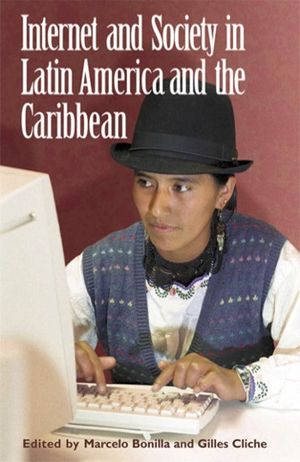Difference between revisions of "Marcelo Bonilla, Gilles Cliche (eds.) (2004) Internet and society in Latin America and the Caribbean"
| (3 intermediate revisions by 2 users not shown) | |||
| Line 1: | Line 1: | ||
| − | + | [[File: IDL-32271-img.jpg | thumbnail | right]] | |
| − | + | == <small>'''Abstract'''</small> == | |
| − | + | The research contained in this book is designed to foster discussion about the policies and actions that must be promoted for building an Internet culture in Latin America and the Caribbean based on the principles of social and cultural equity.<br /> | |
| − | + | This book presents pioneering research that is designed to show, from a qualitative and ethnographic perspective, how new information and communication technologies, as applied to the school system and to local governance initiatives, merely reproduce traditional pedagogical approaches and the dominant forms by which power is exercised at the local level. The studies thus constitute points of departure for further thinking about the need to promote an Internet culture based on the social application of a “right to communication and culture” and an “Internet right,” that will permit the establishment of true citizen participation and free access to knowledge, with due regard to personal and individual rights such as those of privacy and intimacy. | |
| − | This book presents pioneering research that is designed to show, from a qualitative and ethnographic perspective, how new information and communication technologies, as applied to the school system and to local governance initiatives, merely reproduce traditional pedagogical approaches and the dominant forms by which power is exercised at the local level. The studies thus constitute points of departure for further thinking about the need to promote an Internet culture based on the social application of a “right to communication and culture” and an “Internet right,” that will permit the establishment of true citizen participation and free access to knowledge, with due regard to personal and individual rights such as those of privacy and intimacy | ||
| − | [[ | + | == <small>'''File'''</small> == |
| − | [[ | + | |
| − | [[ | + | [[File: IDL-32271.pdf]] |
| − | [[ | + | |
| − | [[ | + | == <small>'''Source'''</small> == |
| − | [[ | + | |
| − | [[ | + | [https://www.idrc.ca International Development Research Center] |
| + | |||
| + | == <small>'''Links'''</small> == | ||
| + | |||
| + | '''URL:''' <br /> | ||
| + | https://www.idrc.ca/en/book/internet-and-society-latin-america-and-caribbean<br /> | ||
| + | https://idl-bnc-idrc.dspacedirect.org/handle/10625/32271 | ||
| + | |||
| + | '''Wayback Machine:''' http://web.archive.org/web/20160831222352/https://www.idrc.ca/en/book/internet-and-society-latin-america-and-caribbean | ||
| + | |||
| + | [[Category:Library]] | ||
| + | [[Category:Southbound]] | ||
| + | [[Category:International Development Research Center]] | ||
| + | [[Category:Marcelo Bonilla]] | ||
| + | [[Category:Gilles Cliche]] | ||
| + | [[Category:English]] | ||
| + | [[Category:Malaysia]] | ||
| + | [[Category:2004]] | ||
Latest revision as of 01:18, 30 April 2017
Contents
Abstract
The research contained in this book is designed to foster discussion about the policies and actions that must be promoted for building an Internet culture in Latin America and the Caribbean based on the principles of social and cultural equity.
This book presents pioneering research that is designed to show, from a qualitative and ethnographic perspective, how new information and communication technologies, as applied to the school system and to local governance initiatives, merely reproduce traditional pedagogical approaches and the dominant forms by which power is exercised at the local level. The studies thus constitute points of departure for further thinking about the need to promote an Internet culture based on the social application of a “right to communication and culture” and an “Internet right,” that will permit the establishment of true citizen participation and free access to knowledge, with due regard to personal and individual rights such as those of privacy and intimacy.
File
Source
International Development Research Center
Links
URL:
https://www.idrc.ca/en/book/internet-and-society-latin-america-and-caribbean
https://idl-bnc-idrc.dspacedirect.org/handle/10625/32271
Wayback Machine: http://web.archive.org/web/20160831222352/https://www.idrc.ca/en/book/internet-and-society-latin-america-and-caribbean
